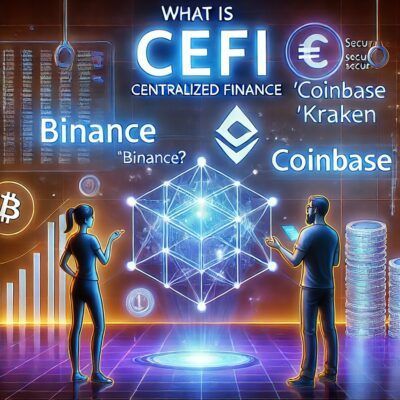What Is CeFi? Discover Its Meaning and Implications with Concrete Examples
What is CeFi? You may have asked yourself this question if you’re interested in the crypto world. But are you sure you’ve received a satisfying answer?
In the dynamic and intricate world of cryptocurrencies, the terms « DeFi » (decentralized finance) and « CeFi » (centralized finance) are often mentioned. While DeFi captivates attention with its boldness and innovation, CeFi remains a fundamental pillar for millions of users seeking security and trust. But do you really know its advantages and disadvantages? Let’s delve into this topic in an engaging and informative way—starting with an imaginary dialogue before diving deeper into its nuances.
CeFi Explained, as if You Asked a Friend
Alex: Hi, Marie! I’ve heard about CeFi while reading articles on crypto, but I don’t quite understand what it is. Can you explain it to me?
Marie: Of course, Alex! CeFi, or centralized finance, is an approach to financial services related to cryptocurrencies. Unlike DeFi, which relies on decentralized protocols without intermediaries, CeFi involves centralized companies like traditional crypto exchanges—Binance, Coinbase, Kraken, to name a few.
Alex: So, CeFi is kind of like banks in the traditional financial system, but for crypto?
Marie: Exactly! CeFi platforms act as trusted intermediaries. They manage users’ assets and offer services like trading, staking, or even loans. For instance, if you deposit Bitcoin on a CeFi platform, the company holds it for you and facilitates any transactions you wish to make.
Alex: But why use CeFi when everyone talks about DeFi being more innovative and liberating?
Marie: Good question! CeFi offers ease of use and a sense of security, especially for beginners. For example, you don’t need to manage your own private key or navigate the often complex interfaces of DeFi applications. Plus, if something goes wrong, you can contact customer support, which is reassuring for many people.
Alex: Interesting… But is it really secure? You often hear about hacks in the crypto world.
Marie: That’s true; CeFi platforms are not risk-free. By entrusting your assets to a centralized entity, you rely on its security and reliability. That said, major CeFi companies invest heavily in cutting-edge technologies to protect funds. But as with any system, it’s essential to do your research before choosing a platform.
Want to Know More?
What Is CeFi? Key Features of CeFi
Centralized finance relies on a structure of intermediaries and trust. Here are some essential elements that set it apart:
- Centralized Control: CeFi companies, like Binance or Coinbase, hold users’ assets and manage their private keys. This means you must trust them to safeguard your funds.
- Simplified Accessibility: The user interfaces of these platforms are often intuitive and user-friendly, making them accessible even to those with no technical knowledge.
- Diverse Services: Beyond trading, these platforms offer a range of financial services such as savings accounts with attractive interest rates, loans, and even debit cards linked to your crypto assets.
- Customer Support: Unlike DeFi, CeFi platforms provide customer support to assist users with technical or administrative issues.
Why Choose CeFi?
CeFi has numerous advantages for those who prefer a more traditional approach to cryptocurrencies:
- Trust and Reliability: Major CeFi platforms are often regulated and operate under strict legal frameworks, which can reassure users.
- Convenience: There’s no need to manage a private key or decode complex processes. CeFi offers a quick and practical entry into the crypto world.
- Economic Integration: Many platforms collaborate with traditional institutions, making it easier to use crypto for purchases or payments.
Criticisms and Limitations of CeFi
Despite its undeniable advantages, CeFi is far from perfect. Here are some frequently criticized points:
- Centralization Risk: By entrusting your funds to a company, you lose some of the autonomy promised by cryptocurrencies.
- Risk of Bankruptcy: If a CeFi platform faces financial difficulties, your funds could be at risk. The most striking example is the collapse of FTX in 2022.
- Less Transparency: Unlike DeFi protocols, whose code is open and verifiable, CeFi platforms often operate with limited transparency.
CeFi and DeFi: Competition or Complementarity?
Although often seen as opposites, CeFi and DeFi are not necessarily rivals. In fact, they can complement each other. For example, some CeFi platforms are already integrating DeFi protocols to offer hybrid services. This convergence could expand possibilities for users and boost global crypto adoption.
What Is CeFi – Conclusion
Centralized finance plays a crucial role in the cryptocurrency ecosystem. By offering a smooth user experience and enhanced security for newcomers, it serves as an accessible gateway to the fascinating world of digital assets. However, it’s essential to understand its advantages and limitations to make informed decisions. Whether you’re drawn to DeFi, CeFi, or a mix of both, the key is to adopt a strategy tailored to your needs and goals. So, are you ready to dive into this extraordinary universe?
Some Reputable Companies Operating in CeFi
Among the well-known CeFi companies are Binance, Coinbase, and Kraken—some of the largest centralized platforms in the world.
- Binance, founded in 2017, is the world’s largest cryptocurrency exchange by volume, offering a wide range of services, including trading and staking.
- Coinbase, based in the U.S., is known for its strict regulatory compliance and user-friendly interface, ideal for beginners.
- Kraken, established in 2011, stands out for its security and international presence, offering advanced tools for experienced traders.

